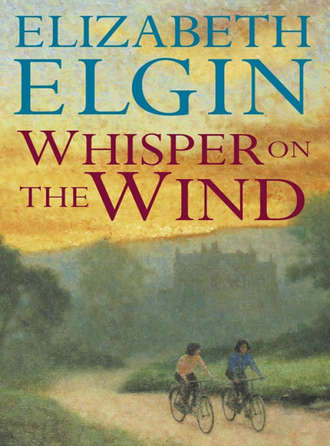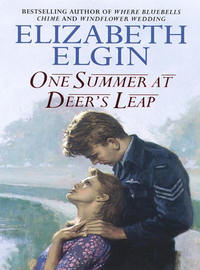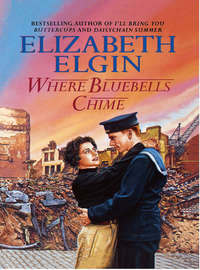
Полная версия
Whisper on the Wind
‘I want you, Roz.’
‘I want you, too. I can’t think about anything else but wanting you.’ ‘Where shall we go?’
‘To the haystack, again.’ Every day for the last week she and Kath had cut deep into that stack, carrying hay to the cows wintering in the foldyard. Soon, it would all be gone, but soon it would be summer and the earth warm beneath them, freezing rain and biting winds forgotten. Soon, they would have no need of it.
They walked, not speaking now, fingers entwined, thighs touching, pausing only to kiss. Now fear was forgotten, caution flung to the sky. Need was all they knew and all else mattered little. The world was them, and only them; only this moment was real.
They sank into the hay and he unbuttoned his greatcoat, wrapped her to him inside it.
‘Do you know something?’ she whispered, her lips on his. ‘Last time, when I got home, there was hay on the back of my coat. I saw it when I took it off and I thought, “Oh, my God!”’
‘I’ll brush you down this time.’
‘Mmm.’ He unfastened her coat and blouse, reached gently to slip the hook of her bra. She wanted him to kiss her until she was desperate with need for him; wanted this night never to end. She didn’t care. She wouldn’t care if the whole of Alderby knew. She wanted them to know.
‘I love you,’ she whispered, as he took her.
It was late when they left the shelter of the haystack. The wind had scattered the clouds and a half moon glinted down on them. Suddenly he said, ‘There was a buzz, when we got back, that our replacement came.’ They must talk, now, of real things, of the world they lived in. ‘It’s brand new, I believe. A woman ferry-pilot flew it up from the makers, they told us, and they diverted her to Linforth – told her to land it there. We’ll have to go over and pick it up, I suppose, when the runway’s in use again. Imagine – a woman, all alone in a plane that size?’
There would be no death on the new Lancaster bomber. A clean slate, another rear-gunner.
‘You won’t be collecting it yet,’ she whispered confidently.
‘No. Not for about a week. Two great holes in the runway to be seen to. We can meet every night.’
Every night, for a week. Seven tomorrows, sweet and safe. She didn’t care about the replacement. It was ten miles away, at another aerodrome. The whole world was ten miles away.
‘I don’t want you to leave me,’ he said as they stood close together at the orchard gate.
‘I don’t want to. I want you to stay with me all night. Could we make it, do you think – a night together?’
‘I can manage it, sweetheart, but what about you?’
‘I don’t know. I’ll talk to Kath about it. Kath can get sleeping-out passes so I could say I was with her. She’ll help me, I know she will.’
‘York? We could hide ourselves in York.’
‘Anywhere. Anywhere they’ll let us be together.’
‘You’re sure?’ He cupped her face in his hands, touching her mouth gently, kissing away her doubts, if doubts she had.
‘I’m sure.’ She had never been so sure of anything in the whole of her life – except perhaps of how much she loved him. ‘Let’s try to make it soon, Paul; as soon as we can?’
There were sixteen more operations to fly; fifteen, and the last one. It had to be soon.
Kath stood in the darkness at the attic window, Barney’s letter clenched in her hand. The reply to her Christmas Day letter, the one she had filled with love and concern, had come.
Well Kath, no need for me to say I’m still hurt by your behaviour but I hope you will give me no more cause for complaint. It is very hot here, sand everywhere. I would give a lot for a pint of good English bitter, pulled of course, in an English pub.
I’m glad you are looking to the future and saving all the Army allowance. More than a hundred pounds a year. Not bad, eh? I can see I shall have that car I’ve always wanted when I get back.
No more cause for complaint? Well, thanks, Barney!
Hot, is it? Well, it’s so damn cold here you wouldn’t believe it. Some of the girls at the hostel were picking sprouts today. You should have seen their hands, Barney. Blue and swollen, numb with frost. I’ll send you some frozen sprouts, shall I, to cool you down?
That car you’ve always wanted? But when rugs and curtains and wallpaper are back in the shops again, I’d thought my savings could be spent on things for our home and some nice easy chairs.
She stuffed the letter into the pocket of her coat, breathing hard in her dismay. Chin on hand, she gazed into the night.
The stillness was touched with moonglow, but it did nothing to soothe her. She pulled her coat to her, shivering not with cold but with an unexplained apprehension.
Was it that strange, just-around-the-corner feeling, the certainty that something was about to happen or was she ashamed, still, of confiding in a stranger in a way no married woman should talk to any man – except her husband. But Marco was her friend, had saved her life, though saving her life should not have made him the keeper of her conscience. What, then, was this feeling of malcontent? Was she, for the first time, finding fault with her marriage or could it be that she missed not her husband, but being a wife?
Quickly she closed the window, drawing the blackout curtains, walking slowly across the room, hand outstretched, seeking the light switch.
Being a wife? She did not miss Barney that way. She never could, never would, for making love with Barney had been nothing more than an embarrassed giving, a closing of her ears to the rhythmic drumming of the bedsprings and closing her eyes to shut out the woman who listened on the other side of the partition wall.
She had known little about making love, save what she had heard whispered by kitchenmaids, so she had expected little from her wedding night. A duty, that’s what being a wife was; something necessary to compensate for her marital status and for the making of the children she wanted and which Barney said they would have one day.
She snapped on the light, blinking in the sudden brightness, then throwing off her coat she undressed quickly and slithered into the pyjamas she had wrapped around her hot-water bottle.
It had been a lot more fun when they were courting, when Barney’s kisses excited her. But even then she had been able to tell him ‘No!’ she thought miserably. And the kissing and cuddling had come to an end on their wedding night. From that night on he had merely taken her, grunting into a darkness for which she had been grateful.
Then why, suddenly, did she feel this way? Did she feel cheated or was this emotion one of envy? Was she jealous of Roz out there in Paul’s arms? Did she, Kathleen Allen, want to snatch at love as Roz did; snatch carelessly, knowing only the need to belong? And why didn’t she ache for Barney as Roz ached for Paul? Was gratitude a poor substitute for love, or did it outlast passion? She folded her clothes with deliberate care, angry with herself for harbouring such thoughts, shocked she could even think them.
Take a long, smug look in a mirror. You could have married any man you wanted …
Mouth set tightly she walked past the wall mirror and taking her husband’s photograph from the chest of drawers she held it to her.
I’m sorry. Lord only knows what nonsense is in my head or where it came from. It’s this war, Barney; this terrible war …
She shrugged into her dressing gown, hugging it around her. There would be a bedtime pot of tea on the kitchen table, and bread and jam. A cup of tea was what she needed, and a comforting jam sandwich.
I didn’t mean to find fault with you, Barney. And I’m sorry I said those things to Marco – but you don’t know Marco Roselli, do you?
Oh, damn, damn, damn! She wasn’t going to that dance on Friday, even if she’d promised she would. Asking for trouble, it would be, with herself in this silly mood.
A pretty dress and gold dancing slippers, indeed! Oh, my word no!
For the first time since that mid-December morning, they delivered milk in daylight.
‘Paul all right?’ Kath asked. ‘Had a good leave, did he?’
‘Great. His sister managed to get home, too. Kath, I want you to help me – need you to help me.’
‘What’s the matter?’ Kath glanced up sharply from the delivery book.
‘Nothing’s the matter. We’re going to York for the night, and I’ll need an alibi.’
‘Roz! Good grief!’ Her cheeks flushed pink. ‘All night?’
‘All night. I don’t know how to fix it at home, though. What do I tell Gran?’
‘You tell me!’ Kath gasped. ‘Now see here, there’s no way I’m going to help you, but I won’t snitch on you, either. You work it out for yourself, then tell me about it. If I’ve got to tell lies, I might as well tell the same lies as you.’
‘Oh, don’t go all prissy on me. I thought you’d understand,’ Roz pouted.
‘I do understand, only I’ll not be a party to deceit; not deceiving your gran, that is. What did you have in mind?’ she asked grudgingly.
‘I thought I could say I was with you; that you’d got a sleeping-out pass and we were going to the last-house flicks.’
‘So we’d be too late to catch the last bus back and have to stay the night?’
‘Something like that. Or we could be going to a dance, maybe? The girls at the hostel sometimes go to a big dance in York, don’t they?’
‘I believe they do – a couple of times a year – but they organize transport to bring them back when it’s over.’
‘Damn!’ It wouldn’t be easy, Roz brooded; she’d never thought it would, but somehow she would make it happen, even if she waited until April to do it.
‘We might have to hold it back till my birthday. I don’t want to, but it might be our only chance.’
‘But wouldn’t you want to have your birthday at Ridings?’
‘Don’t see why. I suppose we’ll push the boat out for my twenty-first and have a good do, then – it’ll depend on the way things are. But I don’t think Gran would worry over much if I said one or two of us were making a night of it, on the twenty-fourth.
‘By the way, have you heard if Gone with the Wind has come up north, yet? I’m longing to see it. It’s been on in London for over a year. They get all the fun in London.’
‘Yes, Roz, and a lot of the bombs.’
‘What’s the matter? You are going to help me, aren’t you?’ Roz demanded.
‘I said I would, and I will. I won’t connive, though.’
‘Because you happen to be wearing your moody hat, this morning? Is that it?’
‘Moody?’ Kath snapped. ‘Who’s moody?’ Roz could be a bit much sometimes!
‘You are. You’re not still worrying about Marco, are you – about what you said to him? Marco’s all right. I like him. I just hope Gran won’t want Mat to get rid of him once the ploughing’s finished.’
‘But she couldn’t do that!’ Not after the way Marco had worked, and on Ridings land, too.
‘She could, she would and she probably will. I’d bet on it.’
‘But that wouldn’t be fair, Roz.’ Surely she wouldn’t do anything as underhanded as that? Marco had fitted in well – he even spoke good English. ‘Surely she wouldn’t be so petty?’
‘All right, all right! Don’t look so pained, Kath. I’m on your side.’
‘Pained? On my side? What on earth do you mean?’
‘I mean that I think you like him. You always stick up for him.’
‘Of course I like him. I like Jonty and Mr Ramsden, too. Don’t try to read meanings into things that aren’t there. That’s how gossip starts.’
‘My, but we’re prickly, this morning. Got a headache?’
‘No, I haven’t. You can be so infuriating, Roz Fairchild. You’re so darned smug and happy that you make me want to – to weep!’
And the worst of it was, she thought dejectedly, Roz was right. Something was irritating her. Last night she had carried her thoughts to bed with her and lain awake, brooding on them and the selfish letter Barney had written.
‘It’s Barney, then,’ Roz pronounced. ‘He’s written you another snotty letter. If I were you –’
‘Well, you’re not me, so you can –’ Oh, it wasn’t any use. ‘You’re right, Roz. Not a nasty letter, but not a nice one. And selfish, too.’
‘Well, I’ve told you what to do, haven’t I? Stick up for yourself.’
Roz pushed wide the creaking lodge gates then picked up Polly’s milk. ‘I told you ages ago,’ she called smugly, over her shoulder.
Oh, Roz; moody and counting bombers you take some living with, Kath directed her thoughts at the jaunty back that disappeared behind Polly’s woodshed. But happy and cheerfully planning a night in York with Paul, you’re impossible!
And dammit, Kath decided, all at once having a try at sticking up for herself, she would go to the Friday-night dance, and more would be the pity if she didn’t bring herself to go the whole hog, and flirt like mad.
‘Y’know,’ she murmured, watching her friend close the gates behind the milk-float, ‘I think I will write to Aunt Min and ask her to send me a nice dress.’ And her gold dancing shoes!
Kath Allen could drive a tractor, harness a pony and milk a cow – by machine, anyway – and she had almost learned to cope with rats, too. So if she wanted to go to a dance with the rest of the girls, then go she would! And for two pins she’d write and tell Barney about it. After all, she might just as well be hanged for a sheep as a lamb.
‘Come on, Daisy.’ She clicked her tongue crisply. ‘Let’s get you home, old girl.’
7
She had enjoyed the Friday-night dance more than she should have, Kath admitted reluctantly, thinking of Skip with whom she’d danced almost every dance.
‘You’re looking very pleased with yourself, Mrs Allen,’ Roz teased, rolling a milk churn to be filled.
‘I was thinking about last night …’
‘I said you’d enjoy it, didn’t I? Thought you’d get on with Skip. He’s nice. I’m glad he’s Paul’s pilot. They don’t come any safer.’
Safe. That was exactly how she had felt, Kath thought, but in a different way. Two marrieds together, and Skip talking about his wife back home and the baby they expected in June. Easy together, they had been.
‘I’m glad I met him – and Paul, too.’ She knew now why Roz was so deeply in love. Paul Rennie was head-turning handsome, no two ways about it, and equally besotted. They had danced in a world of their own, the two of them; so right together, so young, so very beautiful. The kind of beauty, Kath thought sadly, that made the gods jealous.
‘Had you ever thought, Roz, how much time it would save,’ she murmured, directing her attention to the task in hand, ‘if we used waxed cartons for the milk – it would cut out hours of bottle washing.’ She frowned, arranging milk bottles in the sterilizer.
‘I know. Mat did think about it though I imagine he’s glad now that he didn’t get rid of the bottles. Think how difficult it is to get paper; cartons will be hard to come by. They say the paper situation is really serious, and getting worse.’
Paper was certainly in very short supply. Thin, four-page newspapers; little if any wrapping paper in shops – even food shops. It had become common practice to take along your own dish when buying fish and chips and newspaper to carry it home in.
‘Roz – I’ve just thought! It’s ages since I had any fish and chips.’
Fried fish and chips had never been placed on official ration – people said that no government could ever be that stupid, not even the one we were stuck with for the duration that didn’t seem able to win one battle or give out one piece of news worth listening to. Even they weren’t so stupid as to ration fish and chips. It was to the chip shop that a housewife turned when her meat ration was used up and she hadn’t been lucky in the sausage queue nor the offal queue, hadn’t been able to get even the smallest piece of off-the-ration suet to make into a pastry top for a vegetable pie. Queues at chip shops were half-an-hour long and worth every minute of the wait.
There’s a chip shop in Helpsley; we’ll bike over there when the nights get lighter, if you’d like.’
Kath would like, she said. And wouldn’t it be bliss to eat them with her fingers, the only way to eat fish and chips; well-salted, with vinegar oozing through the newspaper wrapping.
‘It’s a date, then. But how on earth did we get on to the subject of fish and chips? I was talking about the dance, and how well you and Skip got on together.’
And I, Roz, was talking about milk in cartons.’
‘Okay. Point taken. But you’ll come again next week, won’t you – if they’re not flying, that is.’
‘I might.’ Might? She’d be there all right and in a pretty dress, too, if Aunt Min didn’t turn funny. ‘It’s a long time since I had so much fun – oh, Roz, look.’
They ran to the door, surprised by the suddenness of the snow. It fell in shilling-sized flakes and was so fast-falling they could hardly see across the yard to the kitchen door.
‘Might have known it – Polly said the weather was too good to last.’
‘More winter to come, you mean?’
‘Right. There’s always a grain of truth in Polly’s prophecies. Sometimes she frightens me.’
‘For goodness’ sake, it’s only a spot of snow.’
It was not a spot of snow. Indeed, it looked like being the heaviest fall of winter, with everything covered white, even as they watched.
‘It’ll put paid to the ploughing if it carries on like this,’ Roz said gloomily. ‘My, but it’s coming down thick …’
Polly Appleby saw the first of the snowflakes and ran to the washing line to gather in the shirts.
Drat the snow. Just when she was beginning to think the bite had gone out of winter, with snowdrops flowering and the buds on the wild daffodils beginning to swell. Now she would have to dry the shirts indoors which was never as satisfactory.
Shirt washing was another of Polly’s sidelines and it was her habit, each and every Saturday, to collect six white shirts from the bay-windowed house standing back from Alderby Green. They were boiled, starched and ironed and delivered, carefully folded, at about three in the afternoon each Wednesday following.
The shirts, a clean one for each day of the working week, were worn by Mr Murgatroyd, a solicitor’s clerk who travelled by train to his work in York. Each and every Wednesday afternoon his wife would nod her thanks and hand Polly the two half-crowns placed in readiness on the window sill and murmur that she would see her again on Saturday, all being well.
She was particular about her husband’s shirts. At less than a shilling a garment she considered she was getting the best of the bargain and to show her appreciation it was her custom to allow Polly first pick of the jumble-sale pile each spring and autumn.
They were good quality shirts, Polly considered, arranging them on the clothes horse to finish drying. It was a fortunate man, she grudgingly acknowledged, whose wife had had the foresight to buy a dozen white shirts one week before the announcement of clothes rationing. It made a body wonder if solicitors’ clerks knew things that lesser folk did not, though good luck to them, if they did. Polly believed in live and let live. Five shillings a week and a good sort through Mrs M’s jumble suited her nicely, and when drying outdoors was possible again six shirts would be little trouble. And happen the dratted snow would be gone by morning.
The snow was not gone by morning. It had continued to fall throughout most of the night and high as the hedgetops it had drifted, with Kath and twenty more landgirls cut off at Peacock Hey, waiting for the snow-plough to reach them.
Jonty had done the milk-round by tractor that morning, for the depth of it had proved too much for Daisy. The snow had frozen into nasty ruts, making farm work ten times more difficult, with the milk cows slithering and sliding in the icy foldyard and beef cattle huddled in the shelter of the hedge, waiting for hay that would be a long time coming.
‘What price working on a farm, now.’ Roz grinned, for frozen snow meant frozen runways and she was not complaining.
‘I suppose Paul couldn’t get out, last night?’ Kath asked. ‘The weather, I mean. We were ages this morning, waiting till the snow-plough got through to us.’
‘He didn’t. It was bad at Peddlesbury, too. He managed to phone me, though. I was lucky – Gran was upstairs when he rang. It’s all wrong, you know, this grabbing at phones and looking over my shoulder. And it’s just as bad for Paul, having to keep it from his parents. I sometimes wonder what would happen if I got pregnant and we had to get married.’
‘Don’t, Roz! What ever you do, don’t get pregnant. You said you’d talk to Paul about it; you promised you would.’
‘And I did, and it’s all right. But supposing something did happen? They’d die of shock. It’s crazy. I’m old enough to get called up and Paul’s old enough to fight, yet still we’ve got to act like it’s wrong for us to be in love.’
‘I know. It isn’t a lot of fun being young these days. But be careful, Roz. You said the Alderby folk could be funny – think of the gossip and what it would do to your gran.’
‘I will, I do, so stop your worrying. We’re not entirely stupid. We both know the way it is for us, that my getting pregnant isn’t on. I want Paul’s babies but not yet; not in this mad world. I wouldn’t be Skip’s wife for anything – wondering when she’ll see him again, if she’ll see him again; wondering if she’ll have to face life without him. Don’t worry, Kath. And for goodness’ sake let’s talk about something else – and not the weather, either. There’s been enough weather-talk since this snow came to last us for the duration. And don’t ask about York, because the more I think about it the more I think we’ll never be able to make it, not even for a night.’
‘Then let’s talk about tinned peaches, all thick with syrup and smothered in cream, and chocolate biscuits and big, thick steaks with onions fried in butter and boxes and boxes of chocolates. Let’s remember when we could buy silk stockings and all the clothes we wanted without coupons, and lipsticks and scent? Where did all the lovely scent go?’
‘Yes, and what about ice-cream? Think about strawberry ice-cream, Kath. Remember when the man came round, ringing his bell, and big cornets for a penny?’
Remember-when was a game, a nostalgic wallowing, a calling back of things almost forgotten.
‘And banana sandwiches, all crunchy with sugar and bread thick with butter – white bread …’
‘Oh, Kath, how long is this war going to last? How long, will you tell me?’
The snow that lay grey and frozen for almost a week gave way to a warm wind that thawed it overnight. Almost at once Peddlesbury’s bombers were airborne again and the ploughing of Ridings’ acres was resumed.
They cut the last furrow on the fourth day of March, three days late yet still a jump ahead of the man from the War Ag. who had not yet come to inspect it.
Mat Ramsden was pleased and relieved. Between them the young men had ploughed close on six acres a day and for more than eight weeks, too. They’d done a grand job. He said as much to Hester Fairchild and she had acknowledged the fact and said she was grateful.
‘So what now, Mat?’
‘So now we get the harrow over it to break up the clods, aye, and some good manure on it, too. Still plenty to be done yet,’ he’d stressed.
‘So you intend keeping the prisoner? There’s no chance of finding a local man – well, they’re so lazy, the Italians …’
‘Not this one, ma’am. He’s worked like a good ’un. Wouldn’t find better, nor cheaper,’ he added in final mitigation.
‘Potatoes, you said, and sugarbeet?’ She knew when enough was enough; she could wait. ‘The War Ag. pay a subsidy on potatoes, didn’t you say?’
‘They do. It’ll nicely cover the cost of the seed. Those old acres of yours’ll be paying you back, come Michaelmas.’ Mat smiled as he took his leave. ‘It’ll be right grand to see things growing again at Ridings.’







